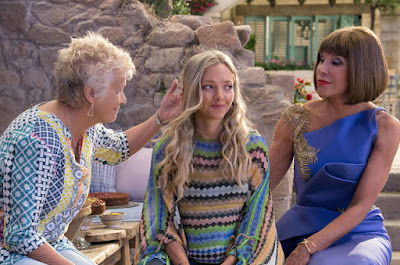Jukebox musicals – you know,
where they string together a bunch of popular songs then wrap a paper-thin
story around them – make sense on stage: they’re basically a live concert with
talking bits. As a movie though, they need a little extra to get them over the line. The first Mamma Mia
had star power in the form of Meryl Streep and a bunch of name brand handsome
guys; with Streep out the door and all the good ABBA songs used in the first
film, why exactly are we coming to the cinemas for this one?
It’s been ten years since Sophie
(Amanda Seyfried) first asked her mother Donna (Meryl Streep) about her three
dads (Pierce Brosnan, Colin Firth and Stellan Skarsgard) and got a whole bunch
of ABBA songs as a reply. Now her mother is dead – presumably from cancer of the StreepDidntWantToReturn – and in tribute Sophie is about to open a hotel on
the Greek island she called home. Then there’s a storm and nobody can make the
launch. Then everybody shows up anyway in what looks like that extremely camp
remake of Dunkirk we’ve all been clamouring for.
Look, this is not a movie
you’re watching for the story, despite extensive flashbacks explaining exactly
how young Donna (Lily James) slept with three separate hot guys within a month
(basically, it was the 70s). And for a while it’s hard to know exactly why
we should be watching: young Donna’s adventures only occasionally spark up
(despite Lily James going flat out selling every moment), while Donna’s
mysterious death hangs over the early scenes like an unspoken deadly death cloud of
death.
That’s not the only mystery
here. Why is the Greek bar Donna first sings in owned by Aquaman? Why is it
assumed that having Donna singing about a female teacher makes “When I Kissed
the Teacher” less creepy? Why does Sophie think turning a farmhouse into a
hotel on a tiny Greek island requires a staff in the dozens? What’s the deal
with the white goat? And why does Sophie’s New York husband Sky (Dominic
Cooper) break up with her by talking into what is clearly a light switch panel
he tore off the wall?
(Actually, the goat is
probably a relation of The Witch’s satanic Black Phillip; the only way to
explain the mountains of food served up at the hotel launch is that the goat
offered Sophie the chance to “live deliciously”.)
But at some point around the halfway mark it all somehow clicks into place: the jokes get funnier, the musical numbers get sillier, and if it never quite hits the deliriously demented heights of the first film it does at least manage to relax into an agreeably bizarre groove.
At one stage someone says ‘Jesus Christ, what kind of island is this”, and this is before Cher shows up in a helicopter to sing "Fernando" to Andy Garcia's robot double (not to be confused with Skarsgard's fat-suit wearing double, which is a thing that actually happens), let alone when Meryl Streep’s ghost turns up to sing one final number before trapping the living cast inside a church she then (I assume) burns to the ground on White Phillip’s orders so everyone can perform the final dance number in Hell.
But at some point around the halfway mark it all somehow clicks into place: the jokes get funnier, the musical numbers get sillier, and if it never quite hits the deliriously demented heights of the first film it does at least manage to relax into an agreeably bizarre groove.
At one stage someone says ‘Jesus Christ, what kind of island is this”, and this is before Cher shows up in a helicopter to sing "Fernando" to Andy Garcia's robot double (not to be confused with Skarsgard's fat-suit wearing double, which is a thing that actually happens), let alone when Meryl Streep’s ghost turns up to sing one final number before trapping the living cast inside a church she then (I assume) burns to the ground on White Phillip’s orders so everyone can perform the final dance number in Hell.
So yeah, it all works out in the end.
- Anthony Morris
-->

No comments:
Post a Comment